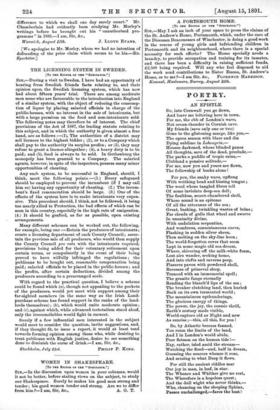THE LICENSING SYSTEM IN SWEDEN. [To ras EDITOR or TSB
" SPICTATOIL,"] Sia,—During a visit to Sweden, I have had an opportunity of hearing from Swedish friends facts relating to, and their opinion upon, the Swedish licensing system, which has now had about fifteen years' trial. There are among moderate men some who are favourable to the introduction into England of a similar system, with the object of reducing the consump- tion of liquor by placing salaried officials in charge of the public-houses, with no interest in the sale of intoxicants, but with a large premium on the food and non-intoxicants sold. The following notes may therefore be of interest. The chief provisions of the Act of 1887, the leading statute relating to this subject, and in which the authority is given almost a free hand, are as follows :—(1), The authorities of a district may sell licences to the highest bidder ; (2), or to a Company which shall pay to the authority its surplus profits; or (3), they may refuse to grant a licence altogether; (4), a heavy duty is to be
• paid; and (5), food is always to be sold. In Gothenburg the monopoly has been granted to a Company. The salaried agents, however, in spite of the inspectors, possess many minor opportunities of cheating.
Any such system, to be successful in England, should, I think, meet the following points :—(1.) Every safeguard should be employed to prevent the incumbent (if I may call him so) having any opportunity of cheating. (2.) The incum- bent's fixed remuneration should be large. (3.) One of the effects of the system here is to make intoxicants very expen- sive. This precedent should, I think, not be followed, it being too nearly allied to Protection, the bad effects of which can be seen in this country, especially in the high rate of emigration. (4.) It should be grafted, as far as possible, upon existing arrangements.
Many different schemes can be worked out, the following, for example, being one :—Retain the producers of intoxicants ; create a licensing department of each County Council; ascer- tain the previous sale of all producers, who would then supply the County Council pro rata with the intoxicants required, provisions being added for their voluntary retirement upon certain terms, or compulsorily in the event of their being proved to have wilfully infringed the regulations ; the publicans to be bought out, reasonable compensation being paid; salaried officials to be placed in the public-houses ; and the profits, after certain deductions, divided among the producers according to a prearranged scale.
With regard to the practical question, I believe a scheme could be found which (a), though not appealing to the pockets of the producers, would yet meet with support among their far-sighted members (in the same way as the Irish Land- purchase scheme has found support in the ranks of the land- lords themselves); (b), which would unite moderate opinion ; and (c), against which, while advanced teetotalism stood aloof, only the irreconcilables would fight in earnest.
Surely if a few influential men interested in the subject would meet to consider the question, invite suggestions, and, if they thought fit, to issue a report, it would at least tend towards forming opinion among those who, while desiring to treat publicans with English justice, desire to see something done to diminish the curse of drink.—I am, Sir, &c.,


































 Previous page
Previous page